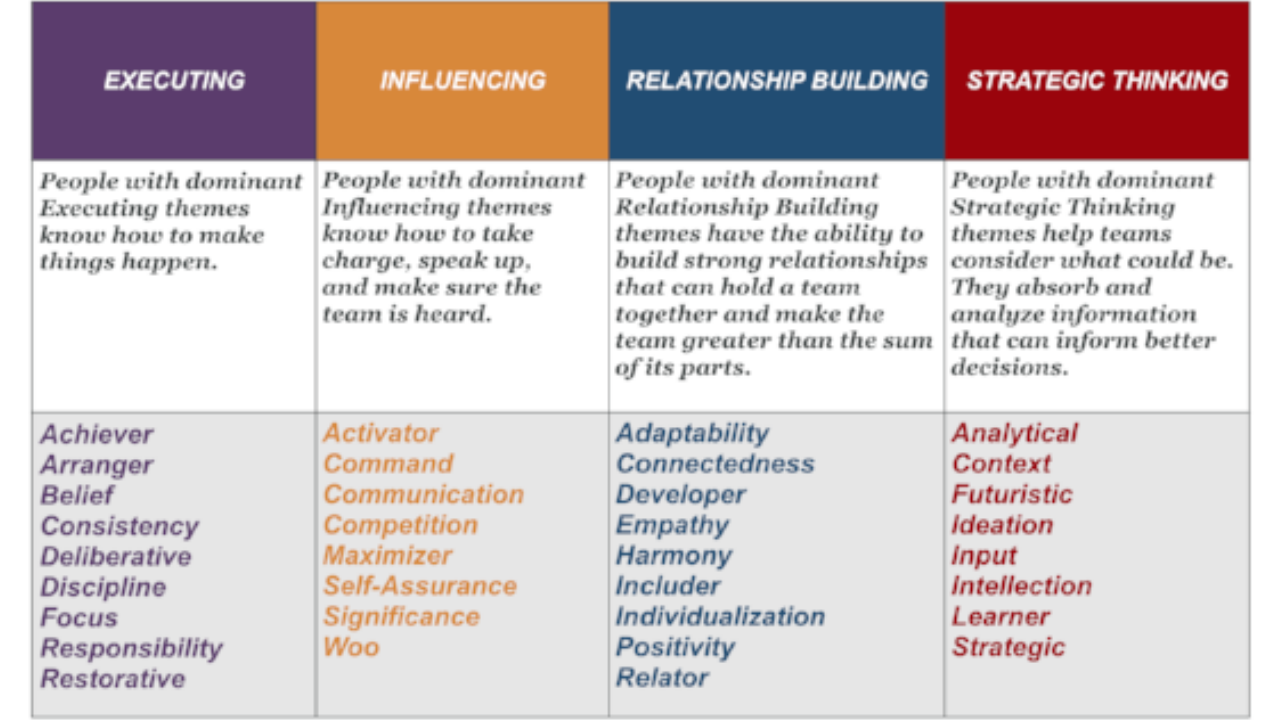3 Things You Need to Know About The CliftonStrengths Assessment
May 06, 2021
3 Things You Need to Know About The CliftonStrengths Assessment
While most people wake up in the morning and identify the “what” and the “how” of their quotidien tasks, folx who are familiar with Gallup’s CliftonStrengths assessment know that the “why” behind what they do is an equally important factor in achieving success.
It is of course important to know what you have to do and how you are going to do it, but without understanding why you are doing something (and why you do it the way you do), motivation lags and performing to the best of your ability becomes nearly impossible.
The CliftonStrengths assessment is a tool used to identify an individual’s natural talents and, well, Strengths that they have possessed from the time they could walk.
There are 34 CliftonStrengths (Communication, Intellection, Achiever, Self-Assurance, and Connectedness are a few examples) that each fall into one of four categories, or domains: Executing, Influencing, Relationship Building, and Strategic Thinking.
The assessment ranks all 34 Strengths in order, depending on how you answer the questions within the assessment. The result is a unique and incredibly detailed Strengths profile that helps you to better understand what you do naturally well, how you can do more of it, and why some tasks feel draining to you while others feel energizing.
To simplify, the CliftonStrengths Assessment is a tool to help folx better understand who they are:
“While your CliftonStrengths 34 profile helps you understand who you are, there is also power in knowing how you make things happen, influence others, build relationships and process information. The framework of the four CliftonStrengths domains — Executing, Influencing, Relationship Building and Strategic Thinking — is another way to think about your CliftonStrengths and how you contribute when you join, create or lead a team.” (Gallup, Inc.)

Understanding the assessment will help you to maximize your experience with CliftonStrengths and to that end, we’ve identified three major elements that we think are worth sharing.
1. The more you know about each of your Strengths, the better you will understand yourself.
Translation: the more you can learn about your Strengths profile, the better equipped you will be to position yourself in roles that you are a natural fit for and that energize you.
You'll also have the tools and language to explain to coworkers, employees, partners and family what you are inherently good at, and why you are the way you are.
The implementation of your unique Strengths profile in both your work and your life more broadly is simple in concept… but only once you’ve done the leg work of learning your Strengths like the back of your hand can you truly and intentionally use your Strengths to your benefit.
Taking the CliftonStrengths assessment is the gateway to being able to clearly identify what your natural talents are, but the real magic happens when you gain a full and thorough understanding of each of your top Strengths.
Your top five CliftonStrengths are a direct reflection of what you naturally do best, and they are your most powerful tools for creating a life both inside and outside of business that is in perfect alignment with who you are and always have been at your core.
2. There's a dark side to each of your top Strengths.
As with many things in life, too much of something sweet can make for a sour experience, and the same is true for your Strengths profile, most notably your top five Strengths.
“The Strengths that land at the top of your profile after you complete the assessment are the most powerful. They represent how you are uniquely talented and are the starting point for living your strongest life possible.” (Gallup, Inc.)
However, certain situations can cause your top strengths to become dialed up too high, resulting in the “dark side” of that strength.
Say for example that your number one Strength is Maximizer.
If you're a Maximizer, you are the kind of person who tends to not pay much mind to weaknesses, preferring instead to focus on making what is already strong even stronger.
Because of this trait, it is likely that when working or doing business with someone who wants to improve what isn’t working well rather than capitalize on what is working well, you get frustrated and annoyed, or even throw in the towel on whatever project or business deal you had started.
The result?
Because your Maximizer Strength was dialed up too high, revealing its dark side, no one involved got what they wanted out of the situation, including you.
It's important to notice when this happens, because with thorough understanding of each of your top Strengths, you can consciously dial each one up or down and intentionally restore the balance between them.
The dark side of our top Strengths can rear its ugly head when we are doing something (or working with/for people) that are out of alignment with our top Strengths or that do not compliment our top Strengths.
So, if you weren’t already convinced that thorough knowledge of your Strengths = thorough ability to position yourself in roles and situations that feel good and energizing… case in point.

3. Strengths are not skills.
In short, (and when referring to CliftonStrengths) a skill is something you intentionally learn. It requires effort and can often be tiring.
A Strength, on the other hand, is something you do (and have always done) naturally.
A Strength is often something you do not realize you are good at because you have never had to invest any time or energy trying to develop it as you would a skill.
Let’s pretend that you are a licensed psychologist. You finished a four-year degree in psychology and even went on to earn your PhD. You’ve been practicing for twenty years and have worked with hundreds of patients, yielding great success.
Having empathy for your patients and their experiences is part of your job description and having been in the field for so long, you have a hard time turning that part of yourself off. And despite feeling exhausted at the end of each day, you are amazing at your job.
And yet, when you take the CliftonStrengths assessment, Empathy is ranked as your 23rd Strength. You would have bet your life that Empathy would be in your top five Strengths, if not your number one Strength.
So what gives? How could you possibly have a successful career as a psychologist without having Empathy as a top Strength?
Skills and Strengths are not mutually exclusive.
That's to say, just because you have developed Empathy as a skill, does not mean that you possess it inherently as a Strength.
If Empathy is not in your top Strengths, and you feel you are a very empathetic person (or your job requires you to be so), you are still likely a very empathetic person!
The fact that Empathy didn't land toward the top of your Strengths profile just means that empathy is a skill that you have had to learn over the course of your life and requires more effort and energy than the Strengths that are at the top of your list.
Take the CliftonStrength Command for example. The defining characteristics of someone with this Strength are having presence, and being able to take control of a situation and make decisions.
As a psychologist, your job doesn’t require you to take charge or impose your views on others. In fact, your job requires that you don’t do these things.
However, when you take the CliftonStrengths assessment, Command is ranked as your number one Strength. Because you’ve held the same job for so long, and have become so practiced at listening to and asking questions of your patients, you have a hard time identifying with the Strength and think that the assessment must be wrong.
This is a common initial response from those taking the assessment. So what’s happening here?
As someone who leads with Command, odds are that people have told you your whole life that you have strong opinions and are not shy about sharing them, often challenging those around you to get honest with themselves or pushing them to take risks.
You may have even been told that you are intimidating. These are all key qualities of the Command Strength. You have great presence, and hiding it (when not impossible) requires immense effort resulting in exhaustion.
This of course explains why you leave your job as a psychologist each day feeling so drained. As hard as you have worked to become a great therapist - and you are a great therapist! - it does not come naturally to you, and it is out of alignment with your Strengths.
When you take the time to deeply understand our CliftonStrengths profile, you gain invaluable insight about who you are and how you show up in the world. You learn to manipulate your personal experience of nearly any situation by being aware of which Strengths need to be dialed up or down.
And perhaps most importantly, you harness your greatest chance at success and fulfillment by strengthening what you naturally do best... and doing more of it.
We hate SPAM. We will never sell your information, for any reason.


